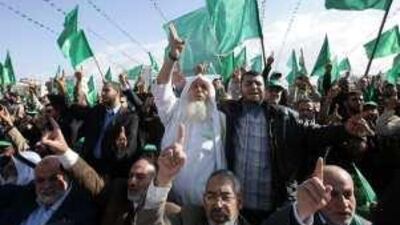Anyone who doubted the resilience of the Palestinian people had only to look at the energy of Gazans as they marked last month the one-year anniversary of the start of Israel's invasion of their penned-up Mediterranean enclave.
For the occasion, the Strip's largest city, parts of it still mounds of rubble, was a study in green. Hamas flags waved from rooftops, lampposts and cars. The yellow banners of the rival Fatah movement, the offspring of Yasser Arafat and once the lynchpin of the Palestinian national struggle, were nowhere in sight. Bands played and scout troops marched in processions, which also celebrated Hamas's birth 22 years earlier. "Gaza is free. Gaza is steadfast," chanted a male singing troupe dressed in camouflage. The crowd, estimated in the tens of thousands, heard Ismail Haniyeh, the Hamas prime minister, proclaim that the movement had scored a "divine victory" in the three-week Israeli offensive.
Given the mood of triumph and sheer tenacity on display, it may be churlish to ask: to what end? Surely, survival and "steadfastness" are themselves worth celebrating. For the 1.5 million people of the Gaza Strip, the Israeli military operation, which ended with a ceasefire one year ago today, was the climax of a gruesome onslaught that began in January 2006 with Hamas's parliamentary election victory and escalated with the ousting of Fatah from the Strip 18 months later.
But there was something hollow, even downright misleading, in the genuflections by Hamas leaders to "resistance". Although they noisily promised "streets paved with fire and hell" before the war, outnumbered and outgunned Hamas fighters mostly avoided direct clashes with Israeli forces during it, according to a report by the International Crisis Group (ICG). "Just because we are ready to die in the path of God doesn't mean we're ready to do it today," the report quotes one fighter as saying amid the combat.
Although little "resistance" was in evidence during Operation Cast Lead and few signs of "victory" after it, Mr Haniyeh was not deterred from reprising the slogan that swept the streets of south Beirut minutes after Hizbollah's 34-day war with Israel ended in 2006 - "divine victory". One Gazan quipped to the ICG: "Another victory or two like this, and we'll be finished." Hamas's failures were all the more acute because the war was neither completely imposed nor entirely unwelcome. Throughout the end of 2008, Hamas courted a military clash with Israel, hoping it would trigger outside mediation, open the border crossings and break the siege of Gaza. Such a confrontation, it believed, would last two weeks and involve limited Israeli incursions.
Hamas officials were horribly wrong - or, as one military expert, Anthony Cordesman, put it drily in an analysis of the war: "It seems clear that Hamas did not understand the probable Israeli reaction." For what occurred was a week of massive aerial bombing followed by a two-week land and air assault. Israel, of course, is to blame for the resulting deaths of 1,393 Palestinians, including 290 children and the destruction of 3,535 homes. Even so, for wildly miscalculating Israel's intentions and provoking a war it could not fight, Hamas, which lost about 150 fighters, shoulders some of the responsibility for this death and suffering, too.
With Hamas leaders said to have gone underground two days before the war began, ordinary Gazans were left to bear the brunt of the assault and to ponder afterwards the tactical decisions that led to it. "I believe in resistance - jihad is in the Quran. But if Hamas cannot protect the people, why didn't they extend the ceasefire?" one woman, whose house was destroyed, asked. Hamas not only erred militarily. It also believed the war would boost its political popularity among Palestinians. Instead, opinion polls last month showed that if legislative elections were held today, Fatah would garner 43 per cent of the vote and Hamas 27 per cent.
It now argues, too, that the war was worthwhile because it illustrated to the world that Israel was not the respecter of human rights it claimed to be. To that purported benefit any observer must ask: how many people actually doubted it? It is true that western governments and their Middle East allies want nothing more than to see any popularly elected Islamist government in the region fail. Yet Hamas appears to be merely helping them along.
It has failed to emerge from the crucible of last year's awful war more sobered with a clearer responsibility it bears for all Gazans, indeed all Palestinians. It still seems incapable of reconciling the differences between its self-image as a movement and its responsibilities as a government. And lacking a sense of urgency, it continues to harbour the conceit that Palestinians, having been swallowed by Israel, will in the fullness of time somehow kill their hosts.
So in October, for instance, it rejected a reconciliation deal after Fatah accepted it. The accord would have been a step towards ending Gaza's impoverishment and isolation - notwithstanding the insistence by anniversary revellers that Gaza is "free". Certainly Hamas and Israel were not the war's only losers. The notion of Arab unity, for which the Palestinian cause is clearly weakening glue, ranks alongside them. There was one glimmer of hope, though: the cause of human rights.
The 9/11 attacks had supplanted it with the focus on fighting terrorism, but with both sides subjected to intense scrutiny about their wartime behaviour, Operation Cast Lead returned it to the forefront of the Israeli-Palestinian conflict. If only the multitude of signs and banners in Gaza City last month had trumpeted that. cnelson@thenational.ae

